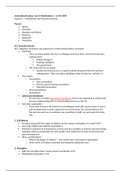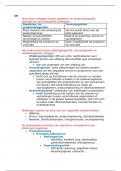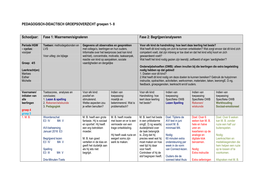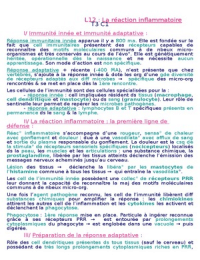International Labour Law & Globalization || 11/02/2020
Lecture 2 – Institutional and Procedural ILO Law
The ILO
1. History
2. Principles
3. Mandate and Mission
4. Structure
5. Standards
6. Procedures
ILO: General Features
ILO > Adoption, promotion and supervision of international labour standards
• Tripartism
o There are three parties that are in a dialogue with each other, and all have decision
making power:
Worker delegates
Employer delegates
The government
o This makes the ILO so unique
Usually international law is created by giving the government the decision-
making power. They vote about adopting certain treaties etc. and that’s it.
They create:
o Conventions
Core conventions
Priority / governmental conventions
Technical conventions
o Recommendations
o Declarations
• Supervisory mechanism
o ILO also has a complex supervisory mechanism. This is very important to understand,
because understanding this is understanding how to use the ILO.
• Technical cooperation
o If you want to have a fair system in social dialogue and trade union in place, if you’re
worried about how to draft a good law of social security. The ILO had advisors for
this and can assist you in whatever you would like to draft; can sent experts to help
you.
1. ILO History
• Founded, along with the League of Nations, by the Treaty of Versailles on 11 April 1919
• One of the oldest international organizations
Primarily in response to humanitarian concern over the condition of workers who were being
exploited without consideration for their health, their family lives or their professional and
social development.
• Other considerations?
o What is the league of nations? – new world order; world peace organization
o Direct result of October revolution and bolsjeviek opstanden enzo
2. Principles
PART XIII Versailles Peace Treaty and ILO Constitution 1919
Philadelphia Declaration 1944
, Declaration on Fundamental Principles and Rights at Work 1998
Declaration on Social Justice for a Fair Globalization 2008
Centenary Declaration for the Future of Work 2019
Declarations are not binding instruments; however sometimes non-binding instruments can still be
very important and still get result, even though they will not hold up in court of law
PART XIII Versailles Peace Treaty
Goals: “whereas the league of nations has for its object the establishment of
universal peace, and such a peace can be established only if it’s based upon
social justice.”
‘Social justice’ is very vague, but still they realized you need this otherwise universal
peace will not hold.
Issues at stake: “whereas conditions of labour exist involving such injustice,
hardship and privation to large numbers of people as to produce unrest so great
that the peace and harmony of the world are imperiled; and an improvement of
those conditions is urgently required.”
“Whereas also the failure of any nation to adopt humane conditions of labor is an
obstacle in
the way of other nations which desire to improve the conditions in their own
countries.”
Picture:
Guy on right = former French minister, head of ILO (interesting contrast)
Guy on left = vice president of ILO
Sitting in front of the first headquarters of the ILO
How can these goals be achieved?
- Regulation of hours of work
- Regulation of labour supply
- Prevention of unemployment
- Adequate living wage
- Protection of worker against sickness, disease and injury
- Protection of children
- Recognition of principle of freedom of association
- Organization of vocational and technical education
- Etc.
Philadelphia declaration 1944
Article I
The conference reaffirms the fundamental principles on which the organization is based
and, in particular, that:
(a) Labour is not a commodity
a. Commodity = stuff. A tradable item on the market. However, labour
should not only be seen as a commodity, because we are talking about
humans, and they have other features and needs as well (self-
development, human dignity)
(b) Freedom of expression and of association are essential to sustained progress
a. Should be able to say what you want
(c) Poverty anywhere constitutes a danger to prosperity everywhere
(d) The war against want requires to be carried on with unrelenting vigour within
each nation, and by continuous and concerted international effort in which the
Lecture 2 – Institutional and Procedural ILO Law
The ILO
1. History
2. Principles
3. Mandate and Mission
4. Structure
5. Standards
6. Procedures
ILO: General Features
ILO > Adoption, promotion and supervision of international labour standards
• Tripartism
o There are three parties that are in a dialogue with each other, and all have decision
making power:
Worker delegates
Employer delegates
The government
o This makes the ILO so unique
Usually international law is created by giving the government the decision-
making power. They vote about adopting certain treaties etc. and that’s it.
They create:
o Conventions
Core conventions
Priority / governmental conventions
Technical conventions
o Recommendations
o Declarations
• Supervisory mechanism
o ILO also has a complex supervisory mechanism. This is very important to understand,
because understanding this is understanding how to use the ILO.
• Technical cooperation
o If you want to have a fair system in social dialogue and trade union in place, if you’re
worried about how to draft a good law of social security. The ILO had advisors for
this and can assist you in whatever you would like to draft; can sent experts to help
you.
1. ILO History
• Founded, along with the League of Nations, by the Treaty of Versailles on 11 April 1919
• One of the oldest international organizations
Primarily in response to humanitarian concern over the condition of workers who were being
exploited without consideration for their health, their family lives or their professional and
social development.
• Other considerations?
o What is the league of nations? – new world order; world peace organization
o Direct result of October revolution and bolsjeviek opstanden enzo
2. Principles
PART XIII Versailles Peace Treaty and ILO Constitution 1919
Philadelphia Declaration 1944
, Declaration on Fundamental Principles and Rights at Work 1998
Declaration on Social Justice for a Fair Globalization 2008
Centenary Declaration for the Future of Work 2019
Declarations are not binding instruments; however sometimes non-binding instruments can still be
very important and still get result, even though they will not hold up in court of law
PART XIII Versailles Peace Treaty
Goals: “whereas the league of nations has for its object the establishment of
universal peace, and such a peace can be established only if it’s based upon
social justice.”
‘Social justice’ is very vague, but still they realized you need this otherwise universal
peace will not hold.
Issues at stake: “whereas conditions of labour exist involving such injustice,
hardship and privation to large numbers of people as to produce unrest so great
that the peace and harmony of the world are imperiled; and an improvement of
those conditions is urgently required.”
“Whereas also the failure of any nation to adopt humane conditions of labor is an
obstacle in
the way of other nations which desire to improve the conditions in their own
countries.”
Picture:
Guy on right = former French minister, head of ILO (interesting contrast)
Guy on left = vice president of ILO
Sitting in front of the first headquarters of the ILO
How can these goals be achieved?
- Regulation of hours of work
- Regulation of labour supply
- Prevention of unemployment
- Adequate living wage
- Protection of worker against sickness, disease and injury
- Protection of children
- Recognition of principle of freedom of association
- Organization of vocational and technical education
- Etc.
Philadelphia declaration 1944
Article I
The conference reaffirms the fundamental principles on which the organization is based
and, in particular, that:
(a) Labour is not a commodity
a. Commodity = stuff. A tradable item on the market. However, labour
should not only be seen as a commodity, because we are talking about
humans, and they have other features and needs as well (self-
development, human dignity)
(b) Freedom of expression and of association are essential to sustained progress
a. Should be able to say what you want
(c) Poverty anywhere constitutes a danger to prosperity everywhere
(d) The war against want requires to be carried on with unrelenting vigour within
each nation, and by continuous and concerted international effort in which the












